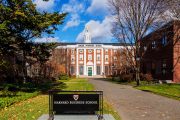
When it comes to expectations of the federal dollar, Shakespeare’s famous quotation about a rose still being a rose no matter what you call it (Romeo and Juliet: "That which we call a rose by any other name would smell as sweet") has met Jonathan Swift’s quip "You can’t make a silk purse of a sow’s ear" — or maybe it was Stephen Gosson’s quip from 1579, if you’re a purist. Washington Times reporter Deborah Simmons revealed yesterday that charter schools in the District of Columbia are in a dither over unfunded mandates and puzzling "standards" as the beginning of a new school year approaches next Monday morning.
So, what are the vexing problems that charter schools are working to solve? Remember, charter schools are essentially government-inspired educational alternatives meant to serve "as competition to public options" since 1996. (Congress and the Clinton administration launched the school-choice movement, creating among other nationwide efforts the D.C. School Reform Act.) If you thought the difficulty might be the need for more math textbooks or teachers, given the troubled economy, you’d have failed this quiz. Ditto for additional science labs. A cynical parent might wonder if there was a need for updated climate-change curricula, now that Al Gore’s concept has, um, crashed and burned. Or maybe that the libraries at charter schools don’t include enough politically correct — I mean "diverse" — literature. No, it must be sex educators — you know, to counter all the inaccurate street gossip and to keep relevant with the top news stories of the day, like same-sex marriage and gays in the military.
Well, wrong, wrong, and wrong again…
The mandates and standards, it seems, all revolve around healthy foods and physical education, including green space for kids to play, and acute shortfalls in the city’s push toward full-time daycare (oops, "universal pre-kindergarten" programs), because all kinds of expensive pre-K programs, in light of this new policy change, have to be added to charters, as well as traditional, elementary schools.
No doubt the obsession with obesity (Healthy Schools Act) and a place to park the toddlers (once called nursery schools) were priorities of parents at Friendship Public Charter Schools in D.C., which has a waiting list of more than 260 for high school — especially those parents concerned about getting their little darlings into a top college. Taxpayers must have been aghast, too. Why, do you realize that some of these charter schools don’t even have a (gulp!) swimming pool, or a regulation-size tennis court, or a football field? Which means there’s a huge disparity in funding between traditional public and charter schools, made even more embarrassing "given that most charters serve lower income populations that often lack resources in their homes and neighborhoods," according to the article in the Times. After all, these are some of the very kids who have their sights on getting recruited by professional football teams. All of us should have our collective posteriors kicked for diverting funding for inconsequential nonsense like math, science, or literature — even of the politically correct variety!
Jesting aside, though, this news story reflects the reason why school voucher schemes and visions of tuition tax-credits helping families to finance real alternatives to government schools both rest upon false assumptions. As long as the spigot of federal funding is still turned on, you will not "make a silk purse out of a sow’s ear." Government education is still a "sow’s ear," and saying so is probably an affront to the beast. Under the best of circumstances, in the toniest of neighborhoods, the public (government) school is going to churn out revisionist history, junk science, fuzzy ("guess-and-check") math, and teach reading as though letters were pictographs or hieroglyphics. Health classes will be mostly about sex, with very little information covering other systems of the human body. Literature will be presented that is lean on the works of "old, white, dead men" but heavy on street banter. Assemblies will be careful to hype every left-leaning cause. World government class will consist primarily of a UN love-fest, and an emphasis on socialistic societies, despite their failure to produce the standard of living achieved in America thanks to our founding documents, which will be given short shrift, if any shrift at all.
What government "experts" deem best for children — whether it applies to childrearing, extracurricular activities, or health — is generally so caught up in politics, vested interests, and extremism that it makes even the ancient, cold one-room schoolhouses seem like improvements. Would teachers today, struggling with class loads of addled, text-messaging, attention-deficit-disordered pupils, not be cheered by the sight, just one morning, of a roomful of tastefully dressed youngsters greeting him or her with, "Good morning, Mr. (or Mrs.) Bloomfield"?
It is ironic that this year’s new feeding and physical-education policies like D.C.’s Healthy Schools Act, aimed at student health and fitness, dictate that schools “feed students locally produced fruits and vegetables.” Parents usually cannot find “locally produced” fruits and vegetables in their grocery stores because all the chains in the entire metropolitan area, including nearby Maryland and Virginia, opt to order from states on the West Coast, Mexico, and Canada, even when local produce, which tastes better and costs less to transport, is in season and available just 10 miles away.
But, then, that’s government incentives for you — making sure parents have to go hunt for unlisted mom-and-pop produce stands to feed their kids the kinds of food federal do-gooders think they ought to have.
Federal money is still federal money, by any other name — and it definitely isn’t there to help you.
Beverly K. Eakman is a former educator and retired federal employee who served as speechwriter for the heads of three government agencies as well as editor-in-chief of NASA’s newspaper (Johnson Space Center). Today, she is a Washington, D.C.-based freelance writer and columnist, the author of five books, and a frequent keynote speaker on the lecture circuit. Her most recent book is Walking Targets: How Our Psychologized Classrooms Are Producing a Nation of Sitting Ducks (Midnight Whistler Publishers).




